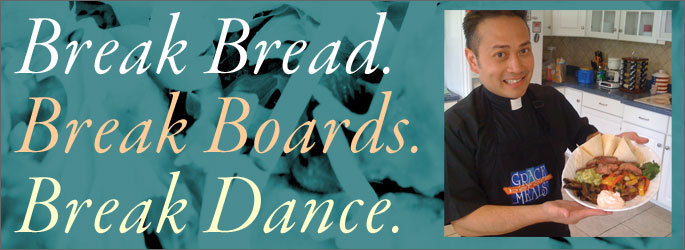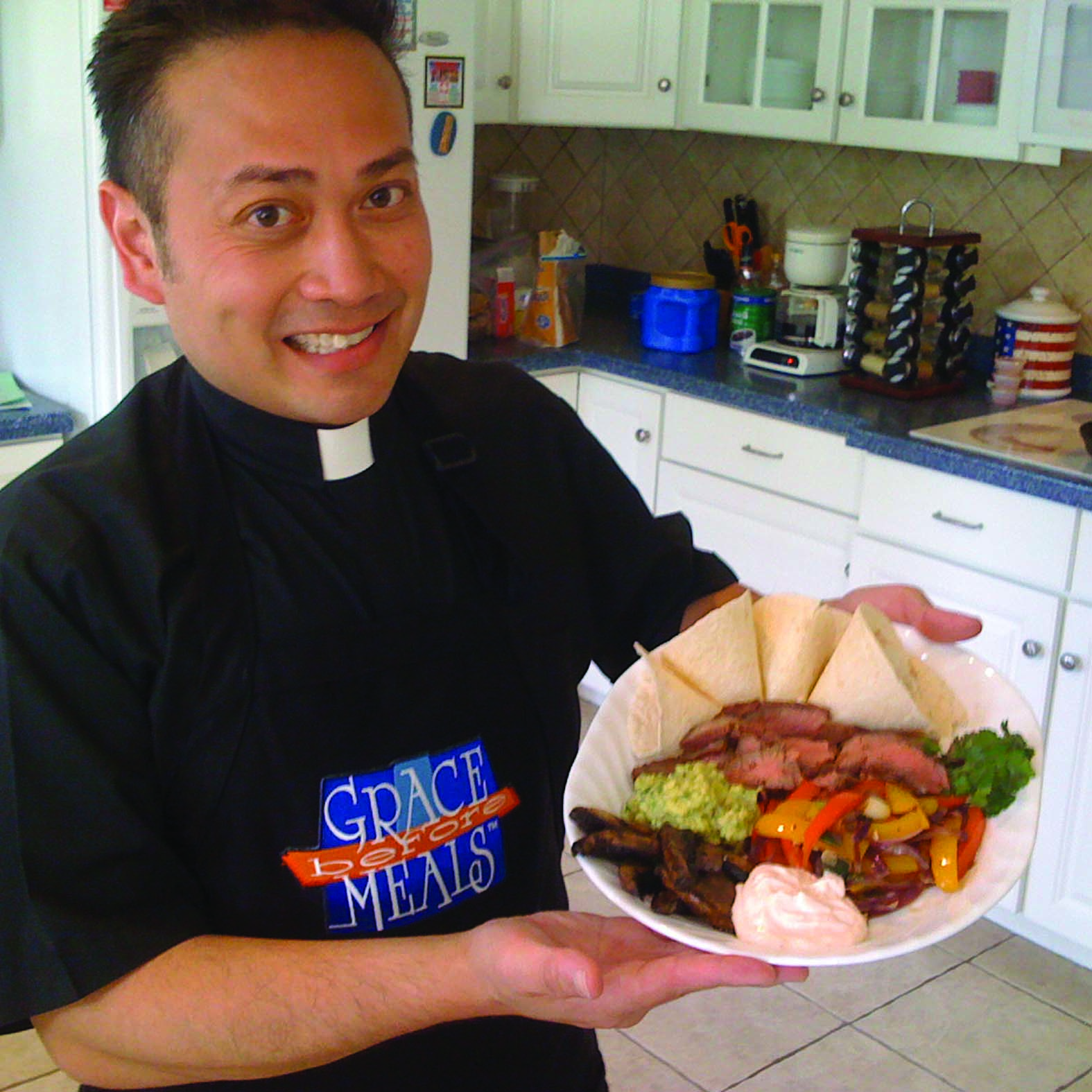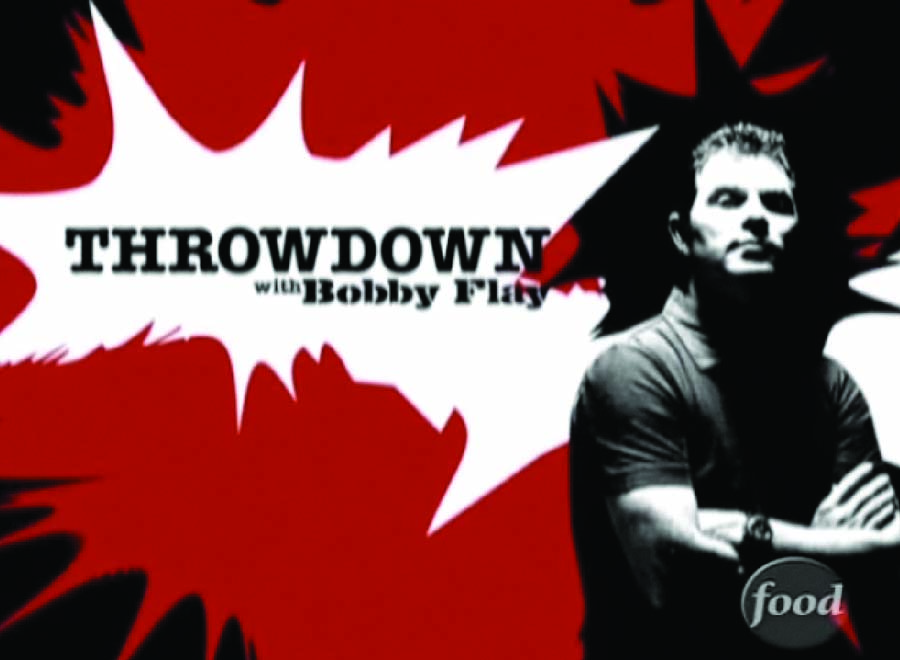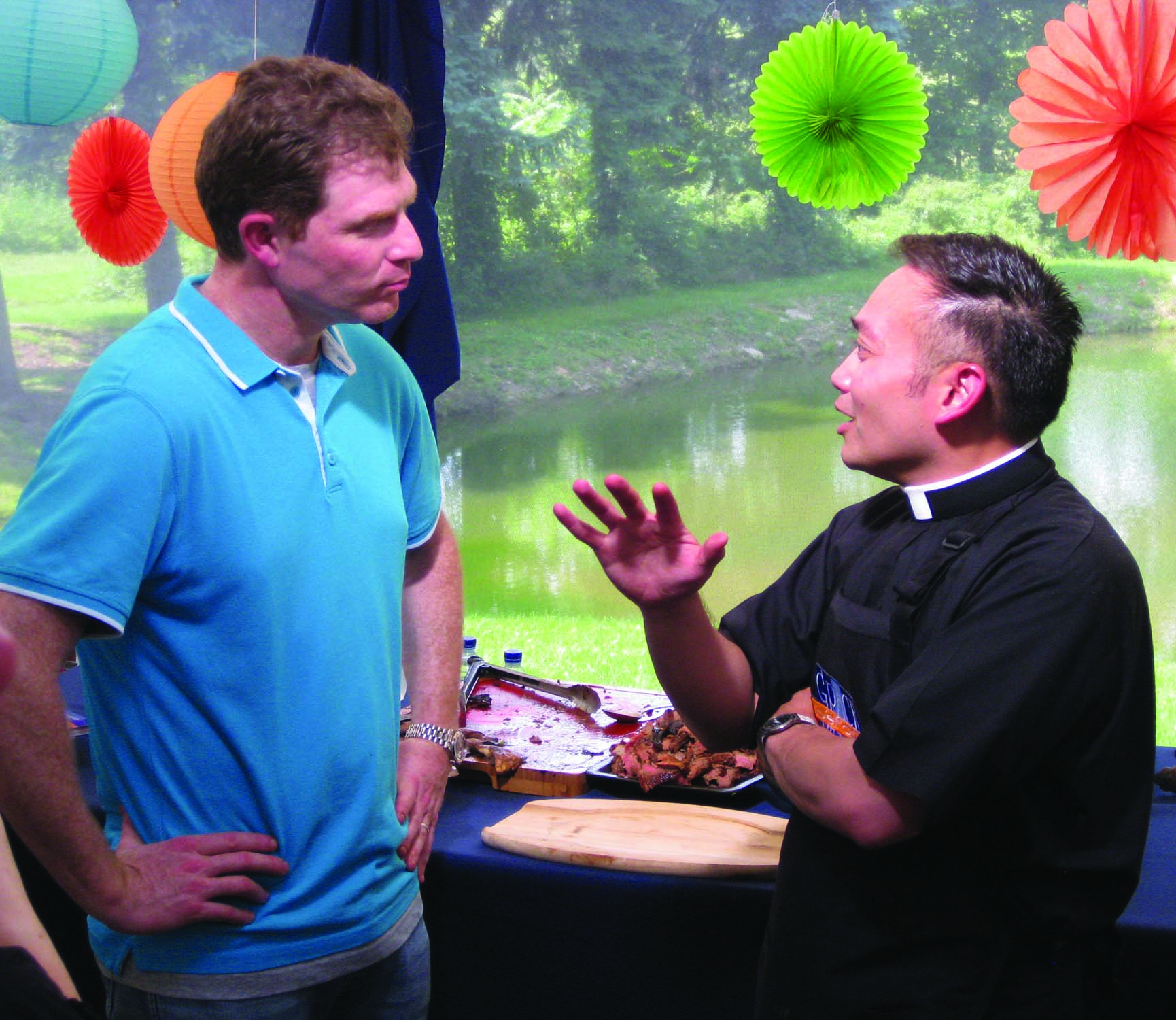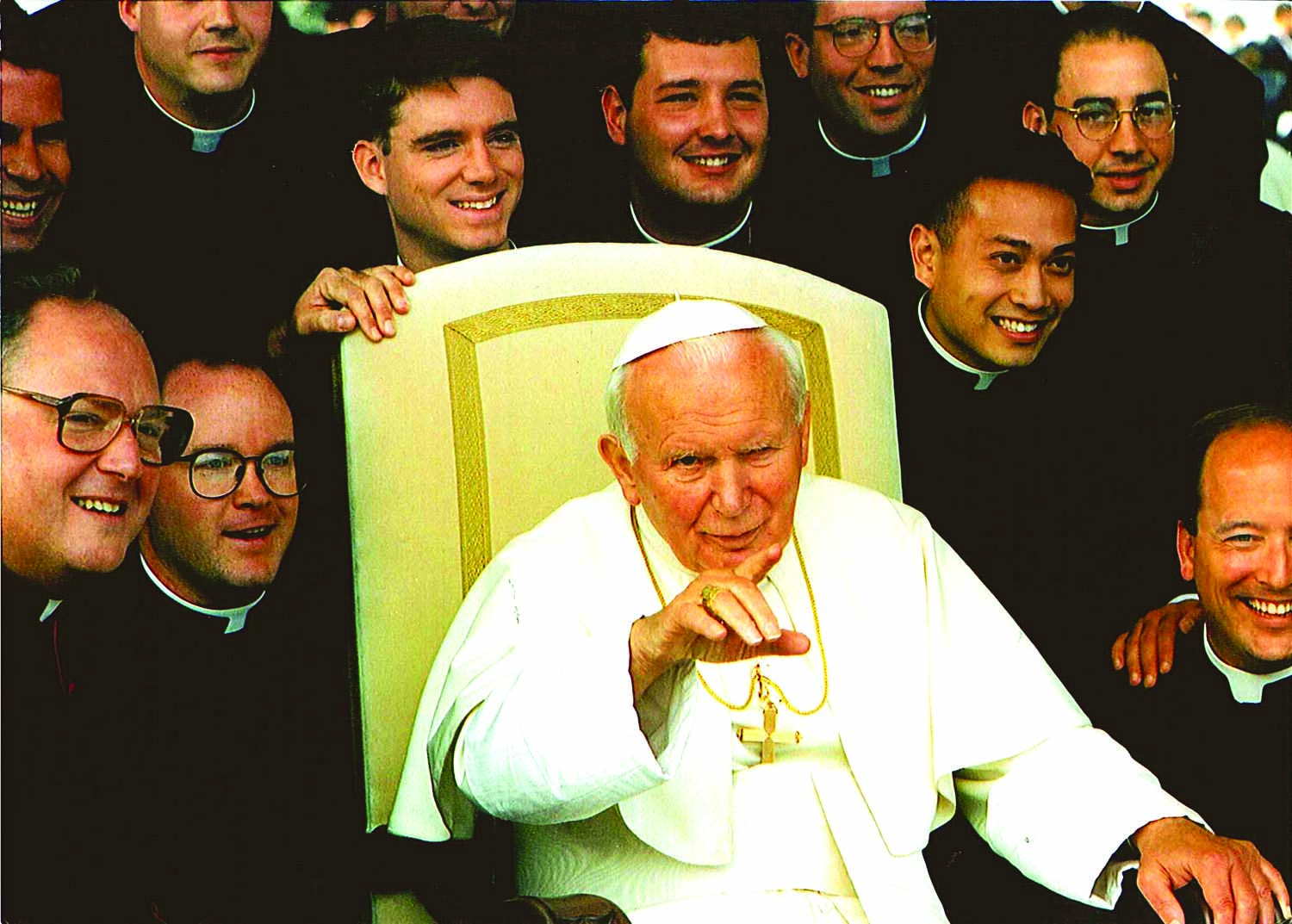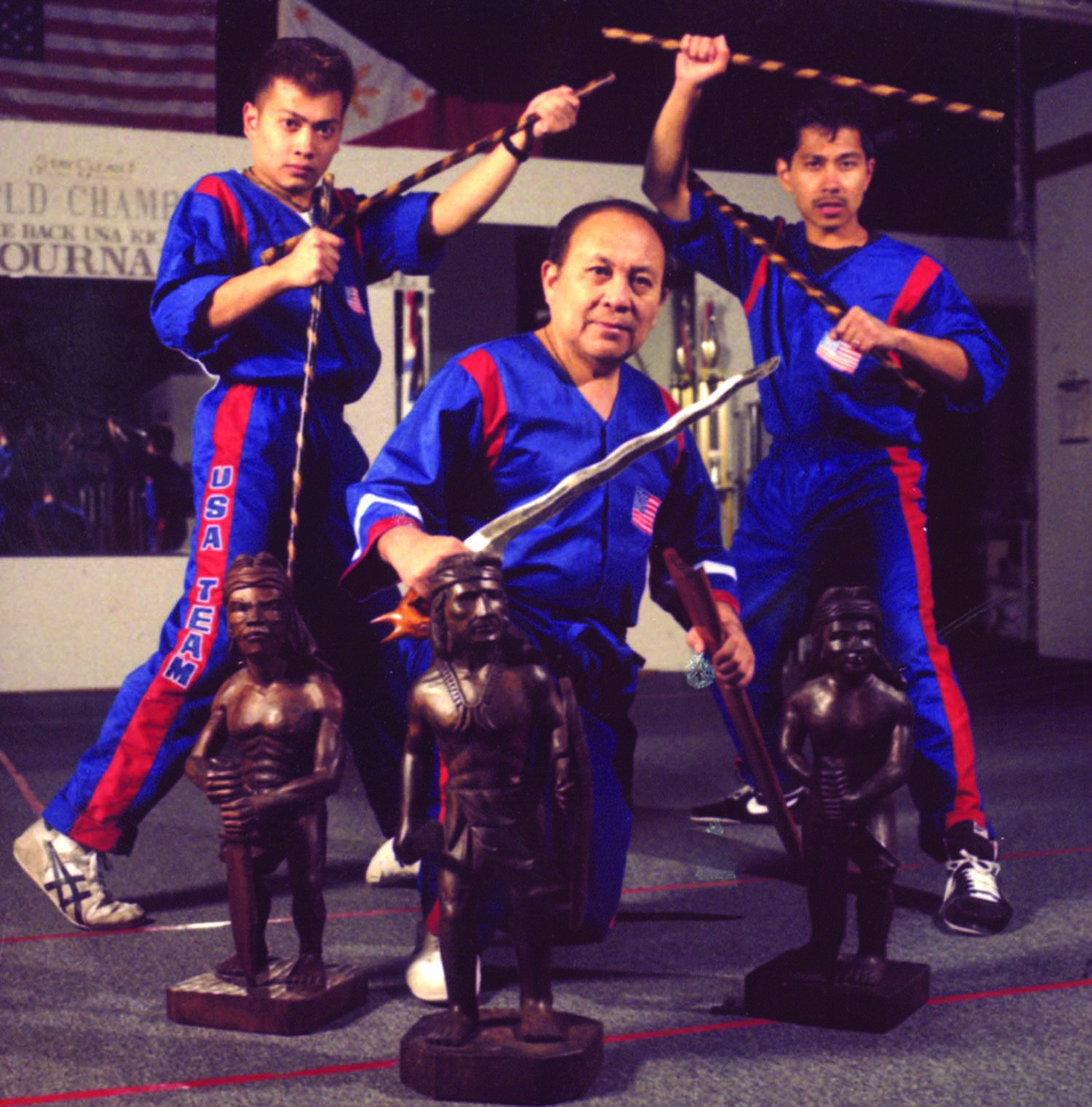UMBC alumnus Father Leo Patalinghug ’92 finds the divine in cuisine and competition. His quest may yet make him one of America’s best-known Catholic priests.
Rev. Leo Patalinghug ’92, political science, says he never gets nervous when he hosts his popular online cooking show, Grace Before Meals. But even he might confess to having a bit of anxiety at a taping of his show that was also filmed by the Food Network last June.
As a rule, Patalinghug concentrates intensely on whatever task is at hand. He often grows impatient, for instance, if he needs more than one take for a segment of the show.
That keen focus on the immediate is likely why Patalinghug didn’t notice Bobby Flay – star of the network’s hit show Iron Chef America – lurking just to his left as he cooked, waiting to challenge the priest to an impromptu culinary contest for his other show, Throwdown with Bobby Flay.
When a producer finally alerted the priest to Flay’s presence on the set to propose a steak fajita contest, Patalinghug finally recognized one of the Food Network’s biggest stars and exclaimed: “My sweet Jesus! What in the heavens are you doing here?”
Patalinghug recovered quickly, at least for the camera. He simply looked back into the camera lens and deadpanned: “Food Network, you lied to a priest!”
When the priest accepted Flay’s Throwdown challenge, the heavens seemed to open up in a cloudburst of people, cameras, lights and activity. Flay’s assistants emerged to help him. Iron Chef Flay – a master of Tex/Mex cuisine – broke out his famous spice rub.
Patalinghug recalls that his hands were shaking, so he started cutting onions for his fajitas. But within no time, Patalinghug and Flay bantered as they cooked.
“You know who taught me how to cut? Mother Theresa,” the priest enthused as he prepared his dish. “When I was a seminarian, I’d go into the soup kitchens, and Mother Theresa said, ‘OK, brother, your job is to cut vegetables.”
Patalinghug whipped up a sweet steak fajita infused with Asian flavors as his entry. Flay took a spicier route and created a red-curry marinated skirt steak fajita. Then, almost as suddenly as the challenge was issued, the fates of both chefs’ dishes were in the hands of two local food writers that the Food Network enlisted as judges.
As the judges critiqued, Patalinghug pulled out a rosary and began praying.
“Do you want one?” he teased Flay. The Iron Chef asked what number “Hail Mary” he had reached. Patalinghug admitted that he had lost count.
Eventually, the judges rendered their verdict. Patalinghug’s fajita had scored higher than Tex-Mex virtuoso Bobby Flay’s. The priest beamed as the crowd cheered and Flay offered his congratulations.
The contest with Flay aired nationally on the Food Network this past autumn, raising the national culinary profile of the telegenic 39-year-old priest even higher. (He already has a schedule bursting with public appearances centered on cooking and Grace Before Meals.)
But the televised throwdown with Flay also showcased other elements of Patalinghug’s personality: his love of competition, his quick wit and his devotion to God and the Roman Catholic Church.
The latter devotion, says Patalinghug, is the most important of all. Indeed, television show and public appearances and a lifetime of competition in everything from the martial arts to break dancing, he insists, is all about connecting people with God through what he calls the “greatest gift of all” – the family.
“We have so many blessings in life,” he says. “It seems that my life’s calling has been to help people recognize those blessings, beginning with the gifts on the table and the people with whom you share it.”
Keep It Simple
Cooking isn’t Father Leo Patalinghug’s only passion.
As an ordained Catholic priest, of course, God is passion number one. Patalinghug lives in Emmitsburg, Maryland, where he directs the Pastoral Field Education program for future priests at Mount Saint Mary’s Seminary.
But through the years, Patalinghug has also found time to become a black belt in karate, a champion stick-fighter, and a competitive break dancer.
Patalinghug’s spiritual journey has literally taken him around the world – from his birthplace in the Philippines to his years at UMBC as an undergraduate to a stop in Italy, where he studied to be a priest at the North American College in Rome.
As the youngest of four children, Patalinghug says he spent a great deal of time in the kitchen with his mother, who was a self-taught cook. The family had moved to the United States from the Philippines, and having fewer amenities than before, his mother had to learn her way around the kitchen. She often put Patalinghug to work, stirring a pot or chopping vegetables.
It was in Italy, however, that Patalinghug saw the power of food and what it could do for togetherness. At the North American College in Rome, he and his peers were required to have a meal together each day. “Even though we were classmates, the meal times made us brothers,” Patalinghug says. When he returned to America after his studies, he decided to bring the positive benefits of his seminary meals to the families in his parish.
His experiences in using food as an ingredient in his ministry inspired Grace Before Meals – which has grown quickly from a blog to a recipe book to the online cooking show. The show’s premise is simple but profound. In a world of fast food, reality TV and jam-packed schedules, bringing parents and kids together for meals is a way to facilitate real communication. Good meals, Patalinghug argues, can make better families.
Patalinghug blames fast food and fear for the disintegration of the family meal. Fast food was supposed to help families spend time together, he observes, but Americans have abused its convenience. “Like other gifts that have come our way, such as the internet and even love and relationships and sexuality,” he argues, “we are abusive with it, so I think we bought into it.”
Fear of happiness is another factor, he continues. “I think there is this fear in people,” Patalinghug says. “They don’t believe, and I use that word very pointedly, that God wants them to be happy and to have a peaceful, loving relationship with each other.”
Patalinghug has honed his culinary skills and his message over countless meals prepared and eaten with families in the parish. Often, they are seeking the priest’s counsel and advice. Sometimes, he finds that family members have trouble speaking with one another. “I just tell them, let’s talk about these things, and in the process, I’ll make you a pretty darn good meal,” Patalinghug says. Most of the time, he adds, it works.
The meals that Patalinghug urges families to prepare and eat together are not fancy. He uses simple tools and simple ingredients in familiar places, which he says makes meals satisfying and memorable.
Taste buds are not the only thing a good meal can satisfy, Patalinghug observes, pointing out that Jesus imparted many of his most important teachings over meals.
“Sometimes, when people hear the word ‘religion’ they hear different things depending on where they’re at in their faith,” he says. “But when you get down to the academic definition, food means ‘to bind’ in Latin. It’s religious because it brings people together.”
When we share meals with others, he says, we share stories. Many faiths have narratives and celebrations linked directly with food, all of which have been passed down through the ages. Most holidays of any sort have meals at the center, he observes, and Patalinghug hopes that Grace Before Meals helps families look at their meals together like holidays.
Hobbies and Holiness
Patalinghug says that when he was ordained, he gave God everything – including his hobbies. And cooking is not the only hobby that followed this priest into his ministry.
Patalinghug’s older brothers, for instance, sparked his early interest in martial arts. He began studying at age 8 and held a junior black belt in his hands by the time he was 12 years-old. When he was 17 years-old, he opened a karate school with his brother as he pursued – and won – international championships in full-contact stick fighting. Patalinghug still uses martial arts when he teaches youth groups and engages in other work with adolescents.
Break dancing – a popular artistic form when Patalinghug was growing up in the hip-hop happy 1980s – was another hobby in which the future priest excelled. He started break dancing with a group of friends at Columbia Skate Land. Despite the fact that they didn’t look the part (“We were all Filipino kids,” he says. “Our fathers, all American doctors.”), Patalinghug’s crew was good enough to dominate local contests -including the 1983 Maryland Break Dancing Competition.
But it was only in his sophomore year at UMBC that Patalinghug decided to take his hobbies – and his life – in a more spiritual direction. UMBC had impressed him as a place where faculty wanted students to “actually learn something,” and Patalinghug dove into a number of extracurricular activities, including singing in UMBC’s Camerata, working for the Student Government Association, and a stint as a disc jockey (“Leaping Leo”) for UMBC’s radio station.
Patalinghug was also deeply involved in local Catholic churches, serving as the music director for his home church and as a youth minister at another church. And he was beginning to sense that he might have a vocation to the priesthood, spurred on in part by conversations that he had with friends out on the patio between UMBC’s University Center and Chemistry building.
He recalls that space as a “hideaway hut” for him and his friends, whom he dubs the “philosophers” of UMBC in that era. “We were just college kids hanging out.” He remembers, “I wasn’t afraid to chat things out with them and have healthy discussions about life.”
Challenging religion courses in his curriculum also led him to ponder his future. Deep questions welling up inside him found answers that led Patalinghug to a higher power, and though he examined a number of religions, it was Catholicism in which he found peace.
“Many of the people were not happy with the Catholic Church at the time, and I remember finding myself defending the teachings but enjoying the debate and appreciating the fact that they offered the debate,” he says. “I found a real comfort in Catholic tradition.”
Patalinghug entered the seminary a year after graduation. He spent much of that year in prayer. “I was scared to death,” he says, “I didn’t understand it at the time.” He was ordained in 1999 and served as a parish priest for five years in Westminster before becoming a faculty member at Mount Saint Mary’s in 2007.
Food, Faith and Future
Watch a few episodes of Grace Before Meals and you get the sense that Patalinghug will do anything to break the ice of familial stress with food – and even a stiff drink or two.
In one episode, Patalinghug arrives at the home of a family that will soon host a party for one hundred people. Humorous quips and a concoction dubbed the “Orange Dew Drop” – Patalinghug’s tasty version of a traditional screwdriver – get the party started early.
“Jesus is going to have to multiply food, and to get us started, we’re just going to make ourselves a little drink,” he jests. He also involves family members and a neighbor in the process, asking them about their favorite drinks. Together they share stories and laughs, as they sip on Father Leo’s cool and colorful drinks. “You can see just how easy it is,” he says. “The food is just the means, not the ends, and that’s important. It’s just a means.”
With increasing fame (he already has a publicist to help him handle it all), what the future holds for Patalinghug is still up in the air. He insists that he’s coping through a combination of prayer and modesty. “I think God is very honest with me in telling me what I can and can’t do,” he says, “I don’t have the messiah complex; I know I can’t solve the world’s problems. I make dinner once in a while, it’s no big deal.”
In the near term, if the Food Network or another channel calls him, Patalinghug seems eager to bring the message of Grace Before Meals to a wider audience as he teaches at the seminary and works with youth groups.
Where he’d like to go ultimately, of course, should be no surprise.
“Hopefully Heaven,” Patalinghug says. “That’s the direction I’m trying to live, and if God wants me to move in different directions, I’m not in bad company.”
* * * * *
Tags: Winter 2010

